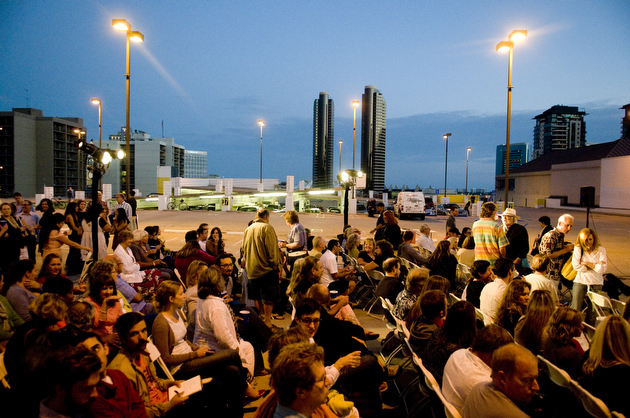Follow Scott Lewis on Twitter (@vosdscott) and you’ll wonder how he has time to get anything done. Regularly tweeting dozens of times a day and engaging in spirited exchanges with followers, Lewis appears to live much of his life online. He does get plenty done in the real world though, often to the chagrin of San Diego’s civic leadership. The Chief Executive Officer of the non-profit news site Voice of San Diego, Lewis views himself as a watchdog first and foremost, taking a hard look at local government, schools, infrastructure – anything that spends your tax dollars.
To Lewis, his presence on social media reflects the larger mission of Voice of San Diego (VoSD), which is less about breaking news than generating a discussion. All of VoSD’s reporters are encouraged to engage in social and new media, sometimes offering a stronger point of view than people might be used to hearing from the traditional media. In the changing media landscape, Lewis said this kind of approach is imperative. People curate their news more, using social and new media to read only what their interested in. In order to attract a new reader, a more interactive approach is vital.
Lewis spoke to the Collaborative Services blog about how he uses social media, and how believes it’s changing journalism in general. As a non-profit, online only news source, VoSD has always been different than your traditional newspaper or broadcast outlet, and therefore may have had a head start on embracing new media, but he said he sees no reason others can’t utilize it as well. And as more and more leaders and organizations use social media to circumvent the usual outlets, he said they better get on board.
– – –
Your news organization, Voice of San Diego, is unique in its own way because it’s an online-only, non-profit news site. Can you talk about how Social Media has helped your unconventional site get attention and readers?
As you point out, we’re non-conventional. Our goal isn’t necessarily just to get readers to our site. As a non-profit, our mission is to do investigative journalism and provide San Diegans with information they need to be advocates for good government and social progress. So really, we are free to use social media not just to link to our stuff, but as another tool to carry out our mission. Often that can simply mean using it to report news or information alone.
Can you talk about how you engage readers on social media? How has it been effective for VoSD?
All of our reporters use it to share their work, links they think are important, insights they have on all kinds of issues and to ask for sources or information in their reporting. In addition, the feedback we’ve gotten on social media has led to stories, or even to important corrections or things we’ve had to hold ourselves accountable to.
Are there any ways it isn’t effective?
Social media can be so engaging that you have to remind yourself it doesn’t necessarily represent the view of the entire populace. It’s like a dashboard for the community conversation but it’s still not ubiquitous.
How can it be effective for more traditional news outlets, like a paper, a TV station, and their respective websites?
People are creating their own personal bundles of information using social media. For instance, they are no longer just watching a channel and letting it serve them what it may. They’re DVRing shows they want to watch. The same thing is happening with news. Twitter and Facebook are allowing people to subscribe directly to the journalists they want to follow. It’s allowing them to store stories they want to read for later. It’s allowing them to construct their menu of news more perfectly for their interests. So if you produce any kind of content or information, it’s not like social media is a different medium you’ll have to manage, it’s a new way of thinking and you will have to be a part of it. You can’t rely on people simply to just watch your channel or listen to your station (except in the car, but even that will be disrupted by on-demand listening – twitter for radio!).
What is the most significant way you’ve seen social media change the news industry?
It’s hard to say. The most interesting thing I saw was when the Israeli Defense Forces tweeted their bombings and propaganda. It was mesmerizing. Twitter has so transformed news it’s really impossible for me to decide what’s most significant. It’s now the blood informing and framing thousands of major discussions every single day.
Most of VoSD’s reporters have an active presence on Social Media, especially Twitter, often discussing stories they are working on. How do you balance this with the competitive nature of the news industry, where most reporters are trying to “break stories,” and be the first to report on something?
Scoops are really not the top priority. We strive to deliver the best service, not necessarily the fastest. Yes, it’s a rush to get something first sometimes but this is not a concern for me. I prefer they take the time to engage with their audience and to cultivate trust on social media.
An important part of Social Media is personality, and “having personality” often means offering an opinion. How do you balance that with the ideals of reporter objectivity?
We recognize and accept that our journalists are human and have views. We don’t believe in objectivity. Our bias is for a better San Diego. The schools can be better, the roads can be better, the environment can be cleaner and the economy stronger. We demand they be fair and that they listen to their detractors. But yes, social media only works if you treat it like a conversation, not a writing exercise. You write as you would speak, knowing that it’s an open mic and your words can travel very far.
In general, what journalistic standards should apply to Social Media? Has it created any new standards?
You shouldn’t have different standards for social media. At all. It’s simply a form of broadcast with amazing avenues for interactivity.
VoSD has a different format and business model than print or broadcast, but it’s still “traditional” in that it has reporters and editors. You’ve spoken before about how much of the power of Social Media is in how it allows people, companies and other organizations to go around traditional media to broadcast their message. In that context, what do you see as the role of traditional media moving forward in a world where leaders don’t need it to broadcast their stories?
With resources diminishing to public service journalism, we can’t be stenographers for people trying to transmit information. They will have to learn how to transmit their own information more and more. Journalism operations need to focus on what people won’t do: Investigate themselves. Our role is to a) make sense of what people say and b) find out what they don’t want to say. The only way professional journalism survives is if it proves itself as such a vital, interesting and beloved service that people are moved to pay for it. Advertising, simply, isn’t cutting it any more.

A Voice of San Diego “Meeting of the Minds” informational event in December, 2012.
(Credit: Voice of San Diego)
Since most Social Media outlets are free, a lot of people use them. How do you break through the white noise of Social Media?
Have a niche, a specialty and a unique voice. Work hard to interact and be valuable but not redundant and obnoxious. Like a radio broadcaster or a writer, success on social media is also about talent. It takes practice and it’s like a game in many ways. You have ups and downs and you try to progress.
– – –
Thank you Scott for sharing your insights on the rapidly changing and often connected worlds of social media and journalism. We look forward to following the Voice of San Diego as it continues to engage its readers on the web and in everyday life.
Elizabeth Malloy, Associate
Collaborative Services, Inc.




Recent Comments